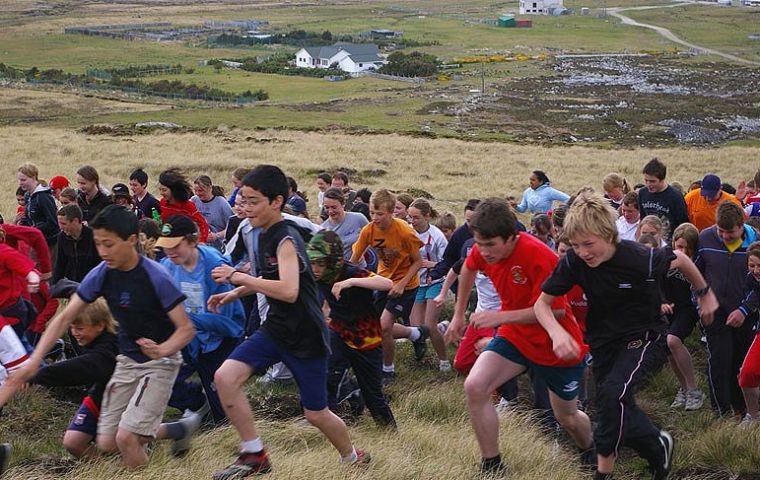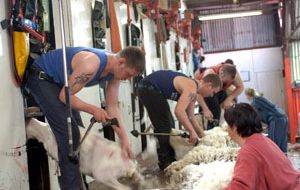MercoPress. South Atlantic News Agency
Falkland Islands’ census shows there are more new homes than new people
 Since 2006 population has grown by 1% but households, 12%
Since 2006 population has grown by 1% but households, 12%  Chileans make 5.3% of the Falklands’ population
Chileans make 5.3% of the Falklands’ population  People living in the Camp total 351, which is 3.3% less than in 2006
People living in the Camp total 351, which is 3.3% less than in 2006 The release of further data from the 2012 Census shows that the Falkland Islands continues to work its magic on immigrants who may have arrived with short term plans but have settled for ten or more years and that the ratio of women to men in the Islands has increased considerably over the last four decades.
The 2012 Census took place on April 15 and provides an up-to-date snapshot, which helps paint a picture of the Islands and its characteristics in 2012. The Census findings are important in helping to identify the needs of the Falklands; aiding FIG decision-making and service planning; and informing the design and implementation of future strategies.
On the night of the Census the total usual resident population was 2,931 of which almost 75% was resident in Stanley. At 2,120 persons the population of Stanley has grown by less than one per cent since 2006, however Head of Policy Jamie Fotheringham noted that this increase may be understated due to the high numbers of persons overseas at the time the Census was conducted.
This opinion is possibly backed up by the fact there has been a 12% increase in the number of households since 2006 and a massive 81% increase since 1986. Excluding those living in communal accommodation a total of 1,237 households was recorded.
The Census shows that 218 house owners have additional homes to those they live in making a total of 268 additional homes. 59% of additional homes in Stanley are rented out to tenants who Mr Fotheringham said demonstrated a strong rental market in Stanley as additional home owners perhaps see their second dwelling as an extra source of income.
He further commented that the number of holiday homes which usually remain empty for large parts of the year, could be another factor behind the increase in the number of households in the Islands while the population has remained almost static. There was, he added, insufficient data to provide a direct comparison between 2006 and 2012.
The population in Camp has continued to decline – decreasing by 3.3% since 2006 to stand at 351 persons, but this is a much slower rate of decline than experienced in the past.
The most populated settlements in Camp are Goose Green (40); Fox Bay (22); Port Howard (22); North Arm (20); and Hill Cove (16).
The ladies have still got more to pick and choose from with the sex ratio of the population at 111 males per 100 females in 2012, compared with 113:100 in 2006, reflecting a slight increase in the proportion of females in the population. This figure is somewhat skewed however by the high proportion of males at MPA (68% of MPA residents are male).
Excluding MPA residents, the sex ratio within the Islands is more balanced with 101 males per 100 females compared to 1972 when the ratio was 123 males per 100 females.
The trend is for an aging population, particularly in the Camp where more than one in five (22%) residents is aged 60 or older. In Stanley the percentage is lower at 16.7% and the number of under 15 year olds has remained constant at 471 since 2006.
For the first time, the 2012 Census asked people to state their National Identity. This was included to ascertain the cultural group that people most closely identify with (and need not be related to the person's place of birth or citizenship).
The results showed that 57% of residents consider their national identity to be 'Falkland Islander'; 24.6% consider themselves British; 9.8% St. Helenian and 5.3% Chilean.
There were 89 respondents who described their national identity as ”Other and the eight per cent of the population who were born elsewhere originated from 57 other countries, with the largest concentrations from Argentina (1.3%), Philippines, Germany, Russia, New Zealand and Ascension Island.
The Census revealed there had been a 25% decline in the proportion of the population born in St Helena since 2006. This decline may be attributable to the new airport development in St Helena, which may be attracting some Saint Helenians back to take up new employment opportunities there.
However the majority of work permit holders from St Helena have been in the Islands for six years or more, suggesting a longer term commitment to the Islands and a reduction in economic migrants from St Helena in recent years.
There is an apparent trend for both St Helenians and Chileans to settle in the Islands with 81% and 67% respectively living in the Islands for more than 10 years.
Although MPA has a high proportion of short term residents, some 18% of MPA residents have been in the Islands for 10 years or more.
There has been some movement in Stanley and Camp populations over the last 10 years with 81 people moving from Stanley to Camp and 93 from Camp to Stanley, although age groups would indicate that those people moving to Stanley do so when nearing or following retirement.
It should be noted that none of the figures referred to within this report include any military personnel serving in the Falkland Islands or their dependents (such individuals are not required to participate in the Census). Hence, references to 'MPA' (Mount Pleasant Airport) mean civilian contractors based at MPA, not serving military personnel.
In the House of Commons last week the British Government was asked by Labour MP Jim Murphy how many civilian and military personnel they have based in the overseas territories.
The Falklands were listed as having 1050 military personnel and 47 civilian personnel based here. (PN)




Top Comments
Disclaimer & comment rules-

-

-

Read all commentsWoah!!! Check her out in the bottom (excuse the pun) picture!!!
May 04th, 2013 - 10:36 am 0That's more like it Mercopress - Whoooaarrrr!
“The results showed that 57% of residents consider their national identity to be 'Falkland Islander'; 24.6% consider themselves British; 9.8% St. Helenian and 5.3% Chilean”
May 04th, 2013 - 12:12 pm 0well well well, straight from the horses mouth a majority of the islanders class them selves as islanders with their own identity and not british, so much for trolls claims of the islanders “are all british”......
.......are Australians british?
.......are Canadians british?
.......are americans british?
.......are new zealanders british?
no! but a majority are of british descent, just like a majority of argentine scum are of implanted Spanish colonialists, but do argentines see themselves as Spanish??
However I can never get enough of reading The Falklands success and progress on mercopress as well as argentinas demise and constant failures.
Argentina is a retard trying to find its mouth with a much cleverer ice-cream :))))
The interesting thing about the Census results is that all the 29 Islanders of Argentine descent consider themselves Falkland Islanders and NOT Argentines!!!!!!
May 04th, 2013 - 03:57 pm 0Commenting for this story is now closed.
If you have a Facebook account, become a fan and comment on our Facebook Page!